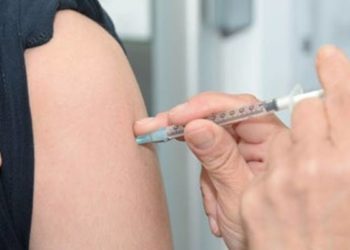No association found between 9-valent Human Papillomavirus Vaccine during pregnancy and adverse pregnancy outcomes
1. No significant increase in spontaneous abortion, preterm birth, major structural defects, or small for gestational age rates were found in women receiving 9vHPV vaccine during pregnancy (within 19 weeks pregnant).
2. No significant differences were found in adverse birth outcomes when comparing vaccinations in women 22 weeks before last menstrual period (distal), 42 days before last menstrual period (peripregnancy), and 19 weeks within pregnancy period (pregnancy).
Evidence Rating Level: 2 (Good)
Study rundown: Human papillomavirus (HPV) vaccination recommendations currently state that pregnant women between the ages of 27-45 years should receive vaccination after their pregnancy due to theoretical risks of vaccination during pregnancy. However, vaccinations still occur in women who are pregnant, as pregnancy testing is not required before vaccination. The purpose of this observational study was to examine these pregnancies, and evaluate if HPV vaccination during pregnancy is associated with adverse birth outcomes. The birth outcomes investigated were: spontaneous abortion, preterm birth, major structural defects, and births with infants small for gestational age. The study grouped 1493 women with a mean age of 23.9 years (SD 2.9 years) into three categories based on when they received vaccination relative to their last menstrual period. The three groups consisted of women who received the 9vHPV vaccine 22 weeks before last menstrual period (distal), 42 days before last menstrual period (peripregnancy), and 19 weeks within pregnancy period (pregnancy). The study compared the rate of adverse birth outcomes after these women gave birth. Overall, the study found that adverse birth outcomes were not significantly different comparing, births from women who received the vaccine up to 19 weeks pregnant, to 22 weeks before pregnancy. The same results were also seen when comparing women in the peripregnant group to the distal group, and peripregnant or during pregnancy group to the distal group of women. The results of this study support the recommendations from the Advisory Committee on Immunization practices because these results do not show evidence for pregnancy testing, as the vaccine should not impact the birth outcome of the pregnancy. A strength of the study included the use of trained medical record abstractors, physicians, and obstetric investigators who were blinded to the study when assigning final birth outcomes. The authors also were thorough when explaining their statistical analysis and mentioning previous work around 9vHPV vaccination and pregnancy. However, more evidence is need before the current recommendations of vaccinating pregnant women can be revised, as this paper has its limitations. In this study, they state the criteria for a spontaneous abortion required the pregnancy to be at 10 weeks gestation. Therefore, any spontaneous abortion before or after this time was not accounted for, which could have led to lower spontaneous abortion rates reported in this study, as a previous study done by Moreira et. al showed much higher spontaneous abortion rates in pregnant women. In addition, when investigating structural birth defects, the defect must have resulted in 1 outpatient visit and at least 4 months of insurance enrolment to be included. This might have excluded any women without continuous medical insurance, potentially biasing those of lower socioeconomic status. The study acknowledges this limitation and future studies should be done offering free care to the women in order to remove this limitation.
Click to read study in JAMA Network Open
Relevant reading: Safety Profile of the 9-Valent HPV Vaccine: A Combined Analysis of 7 Phase III Clinical Trials
In-depth [Retrospective cohort]: This study retroactively observed the births from 1493 women who received the 9vHPV vaccine distal to their pregnancy, up to 42 days before their last menstrual period, and up to 19 weeks during their pregnancy. The study used data from the Vaccine Safety Datalink, which consisted of information from 7 sites in the United States. Of the 1493 women, 552 of the them were grouped under the distal group, while 496 were grouped in the peripregnancy and 445 of them in the pregnancy group. When adverse birth outcomes in the pregnancy exposure group was compared to the distal exposure group using a Cox proportional hazards regression model, the pregnancy exposure group had a lower percentage of spontaneous abortions, and preterm births with values of 5.6% and 6.2% respectively, compared to values of 6.0% and 8.1% in the distal group. The pregnancy exposure group, however, had a higher percentage of small gestation weight births, and births with structural defects with values of 8.5% and 1.3% respectively, compared to values of 6.4% and 1.0% respectively in the distal group. These differences were insignificant however, as the relative risk ratio between groups for spontaneous abortion. Preterm births, small gestation weight, and major structural defects were 1.21, 0.73, 1.31, and 1.30 respectively, all lower than the statistically significant value of 1.75. A similar trend can be seen when comparing the peripregnancy group to the distal group, as the peripregnancy group had lower rates of spontaneous abortion and preterm births, but higher rates of small gestation weights and major structural defects when compared to the distal group. These values also had relative risk ratio values under 1.75. The average age of the women in this study was 23.9 with a standard deviation of 2.9 years, with over 50% of women in each group between the ages of 25-28, as well as from a Hispanic ethnicity.
Image: PD
©2021 2 Minute Medicine, Inc. All rights reserved. No works may be reproduced without expressed written consent from 2 Minute Medicine, Inc. Inquire about licensing here. No article should be construed as medical advice and is not intended as such by the authors or by 2 Minute Medicine, Inc.








